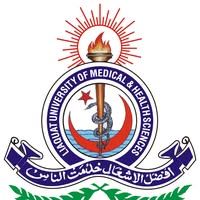预约演示
更新于:2025-10-18

Liaquat University of Medical & Health Sciences
更新于:2025-10-18
概览
关联
43
项与 Liaquat University of Medical & Health Sciences 相关的临床试验NCT06227858
Investigation of the Psychological and Physiological Effects of a Standardised Saffron Extract Supplementation on Symptoms Associated to Perimenopause in Healthy Older Women: A Randomised Double-blind, Placebo-Controlled, Parallel-group Clinical Trial
The aim of the present study is to assess the effects of a normalised saffron extract supplementation, which is an extract of the flower Crocus sativus, on perimenopausal symptoms.
开始日期2025-08-20 |
申办/合作机构 |
NCT06983223
Oral Sucrosomial® Vitamin B12 in the Management of B12 Deficiency Among Metformin-Treated Type 2 Diabetes Patients: A Randomized, Double-Blind, Placebo-Controlled Clinical Trial
This randomized, double-blind, placebo-controlled clinical trial aims to evaluate the effectiveness of Sucrosomial® Vitamin B12 supplementation in the management of vitamin B12 deficiency among metformin-treated Type 2 Diabetes Mellitus (T2DM) patients. The study will compare the impact of daily Sucrosomial® B12 (1,000 mcg) versus placebo on serum vitamin B12 levels, Holo-Transcobalamin II (HoloTCII), and Transcobalamin I (TCI) levels over a 4-week period. Secondary outcomes include assessment of safety, tolerability, and glycemic control (HbA1c). Fifty participants will be randomly assigned to either the Sucrosomial® B12 or placebo group.
开始日期2025-08-15 |
NCT06982365
Study to Investigate the Potential Health Benefits of Grapes Seeds Extract Supplementation in the Management of Elevated Blood Pressure or Stage 1 Hypertension: A Pragmatic Randomized, Double-blind Placebo Controlled Trial
This study is a pragmatic, randomized, double-blind, placebo-controlled trial aimed at evaluating the potential health benefits of Enovita® (standardized grape seed extract) supplementation in adults with elevated blood pressure or Stage 1 hypertension. The primary objective is to assess the impact of Enovita® on systolic and diastolic blood pressure over 8 weeks. Secondary outcomes include changes in mood, emotional well-being, perceived stress, lipid profile, and systemic inflammation. The study will also monitor the safety and tolerability of Enovita®.
开始日期2025-08-01 |
100 项与 Liaquat University of Medical & Health Sciences 相关的临床结果
登录后查看更多信息
0 项与 Liaquat University of Medical & Health Sciences 相关的专利(医药)
登录后查看更多信息
1,022
项与 Liaquat University of Medical & Health Sciences 相关的文献(医药)2026-01-01·ARCHIVES OF MEDICAL RESEARCH
Biochemical Profile of Recovered Individuals With Mild COVID-19: A Cross-Sectional View at Two Different Time Points
Article
作者: Abbas, Uzair ; Babar, Nisha ; Nasrumminallah, Maryam ; Khalid, Muhib Ullah ; Mukhtiar, Sawairah ; Hafeez, Sumbal ; Ashraf, Shizrah ; Hussain, Niaz ; Kumar, Pershad ; Ahmed, Ishfaque ; Khan, Muhammad Shahid
AIM:
This study was designed to cross-sectionally evaluate the frequency of long COVID-19, along with their hematological and biochemical parameters in survivors of mild COVID-19 after 6-15 months of acute infection.
METHODS:
We recruited 75 age-matched healthy controls (HC) and 150 individuals who had recovered from mild cases of COVID-19. The recovered individuals were grouped according to the time elapsed since acute infection: 6-10 month (CoV_A) and >10-15 month of recovery (CoV_B). A brief clinical history was taken and detailed hematological and biochemical blood parameters were measured.
RESULTS:
In our study, 64% of individuals had symptoms of long COVID. There were differential symptoms and presenting complaints associated with time since acute infection. The recovered group had significantly different hemoglobin concentration, red blood cell (RBC) count, white blood cell (WBC) count, lymphocyte, interleukin-6 (IL-6), alanine aminotransferase (ALT), alkaline phosphatase (ALP) and vitamin D3 levels, compared with the healthy controls (p<0.05). Differences were also found between the 6-10 months and the >10-15 month recovery groups (p<0.05).
CONCLUSION:
Differential biochemical markers related to the time elapsed since acute infection show a different metabolic and biochemical status of the host at different time points after infection. Moreover, the pathophysiological pathways involved in these dysregulated biochemical markers should also be studied in relation to the long term impact of COVID-19 infection.
2026-01-01·INTERNATIONAL JOURNAL OF CARDIOLOGY
Letter to the editor: Duration of atrial fibrillation and cardiac biomarkers are associated with cardiovascular outcomes in early permanent atrial fibrillation: Data from the RACE II study
Letter
作者: Das, Ravi ; Lohana, Sunita ; Lohano, Govinda ; Lohano, Gaaitri
2025-12-01·INTERNATIONAL JOURNAL OF CARDIOLOGY
A critique on the association between non-classical monocytes and HFpEF pathophysiology
Letter
作者: Sheikh, Hafsa ; Atif, Muhammad Mudasir ; Jawad, Muhammad
100 项与 Liaquat University of Medical & Health Sciences 相关的药物交易
登录后查看更多信息
100 项与 Liaquat University of Medical & Health Sciences 相关的转化医学
登录后查看更多信息
组织架构
使用我们的机构树数据加速您的研究。
登录
或

管线布局
2026年02月28日管线快照
无数据报导
登录后保持更新
药物交易
使用我们的药物交易数据加速您的研究。
登录
或

转化医学
使用我们的转化医学数据加速您的研究。
登录
或

营收
使用 Synapse 探索超过 36 万个组织的财务状况。
登录
或

科研基金(NIH)
访问超过 200 万项资助和基金信息,以提升您的研究之旅。
登录
或

投资
深入了解从初创企业到成熟企业的最新公司投资动态。
登录
或

融资
发掘融资趋势以验证和推进您的投资机会。
登录
或

生物医药百科问答
全新生物医药AI Agent 覆盖科研全链路,让突破性发现快人一步
立即开始免费试用!
智慧芽新药情报库是智慧芽专为生命科学人士构建的基于AI的创新药情报平台,助您全方位提升您的研发与决策效率。
立即开始数据试用!
智慧芽新药库数据也通过智慧芽数据服务平台,以API或者数据包形式对外开放,助您更加充分利用智慧芽新药情报信息。
生物序列数据库
生物药研发创新
免费使用
化学结构数据库
小分子化药研发创新
免费使用